Ethics in Practice: Leaving Firm and Telling People Why! Case Analysis Now Included
How does your choice about the investment counselor’s behavior compare with the analysis for this week’s case (26 March). Check it out below.
Everyone has likely been unhappy with their employer at some point in our professional lives. But if you decide to leave the job, where is the ethical line when sharing with others about why you are leaving? Read on about how one investment counselor handled this situation and then join the conversation to let us know whether you think she violated the CFA Institute Standards of Professional Conduct and why.
Case
Nickoli is an investment counselor with HHI Capital Management. A colleague at her local CFA Society encourages Nickoli to leave HHI and join her at Vesuvius Asset Advisers. Nickoli eventually agrees and determines to leave at the beginning of the new year. Over the course of a few weeks prior to tendering her resignation, she mentions to her clients that they will likely be working with a new investment counselor in the new year because she will be leaving HHI in the coming weeks. Her clients express their surprise, and when pressed for details about why she is leaving, Nickoli shares that she is frustrated by and disagrees with the structure and direction of the firm, she disagrees with and does not have confidence in the current leadership, she does not believe the firm will be able to attract and retain good people, and other HHI employees have been mistreated and will also be leaving soon. Several of Nickoli’s clients indicate that they would like information about Vesuvius and may be interested in switching their accounts. After submitting her resignation, Nickoli immediately relays the names of those clients to Vesuvius, and after the first of the year, she begins soliciting them to transfer their accounts from HHI to her new firm. Nickoli’s conduct is
- acceptable because she is looking out for her clients’ best interest and believes Vesuvius provides better service.
- acceptable because she provides her opinion of HHI in response to questions from clients.
- acceptable because she did not solicit clients until after she left HHI.
- unacceptable because she made disparaging remarks about HHI to clients while she was still with the firm.
Analysis
Answer D is the best response because this case relates to CFA Institute Standard IV(A): Duty to Employer – Loyalty, which states that CFA Institute members and candidates “must act for the benefit of their employer and not…otherwise cause harm to their employer.” Although a departing employee is generally free to make arrangements or preparations to change firms before terminating the relationship, those preparations must not conflict with the employee’s continuing duty to act in the best interests of the current employer and not otherwise undermine, disparage, or cause harm to the current employer. In this case, Nickoli decided to leave HHI and join Vesuvius several weeks before she submitted her resignation and notified the firm. During that time, Standard IV(A) obligated her to continue to act in the employer’s best interest and not engage in any activities that would conflict with this duty until her resignation became effective. Nickoli violated her duty of loyalty to HHI by making disparaging and harmful statements about the firm to its clients in the weeks prior to submitting her resignation and by promoting Vesuvius to HHI clients while she was still employed by HHI. Although she did not make actual solicitations until after she left HHI, Nickoli used the final weeks of her employment with HHI to contact and gauge which of the firm’s clients may be interested in receiving information about Vesuvius and possibly transferring their accounts from HHI. And although an investment professional should protect the client’s best interest, even if Nickoli believes the clients will be better off with her at Vesuvius, the clients’ relationship is with HHI. She is a representative of HHI, so she cannot malign the firm while still employed, even in response to questions.
This case is based on a disciplinary case handled by the CFA Institute Professional Conduct group. The member in question received a Private Censure.
Have an idea for a case for us to feature? Send it to us at [email protected].
More About the Ethics in Practice Series
Just as you need to practice to become proficient at playing a musical instrument, public speaking, or playing a sport, practicing assessing and analyzing situations and making ethical decisions develops your ethical decision-making skills. The Ethics in Practice series gives you an opportunity to “exercise” your ethical decision-making skills. Each week, we post a short vignette, drawn from real-world circumstances, regulatory cases, and CFA Institute Professional Conduct investigations, along with possible responses/actions. We then encourage you to assess the case using the CFA Institute Ethical Decision-Making Framework and through the lens of the CFA Institute Code of Ethics and Standards of Professional Conduct. Then join the conversation and let us know which of the choices you believe is the right one and explain why. Later in the week, we will post an analysis of the case and you can see how your response compares.
Image Credit: ©CFA Institute


D